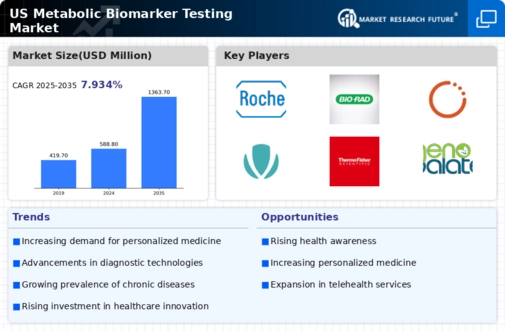Enhanced Awareness of Metabolic Health
The growing awareness of metabolic health among the general population is significantly impacting the metabolic biomarker-testing market. Educational initiatives and health campaigns are increasingly informing individuals about the importance of monitoring metabolic parameters, such as glucose levels and lipid profiles. This heightened awareness is likely to drive demand for testing services, as more people seek to understand their metabolic status and take proactive steps towards better health. The metabolic biomarker-testing market stands to benefit from this trend, as healthcare providers respond to the increasing consumer interest by offering a wider range of testing options and personalized health assessments.
Growing Focus on Preventive Healthcare
There is a notable shift towards preventive healthcare in the US, which is significantly influencing the metabolic biomarker-testing market. As healthcare systems increasingly prioritize early detection and prevention of diseases, the demand for metabolic biomarker testing is expected to rise. This proactive approach not only helps in identifying risk factors but also facilitates timely interventions, potentially reducing the burden of chronic diseases on the healthcare system. The metabolic biomarker-testing market is likely to see growth as more individuals and healthcare providers recognize the value of preventive measures. Furthermore, public health campaigns aimed at educating the population about the importance of metabolic health are expected to drive awareness and adoption of these testing services.
Advancements in Analytical Technologies
Technological innovations in analytical methods are propelling the metabolic biomarker-testing market forward. Techniques such as mass spectrometry, nuclear magnetic resonance, and high-throughput screening are becoming increasingly sophisticated, allowing for more accurate and rapid analysis of metabolic biomarkers. The integration of artificial intelligence and machine learning into these technologies is further enhancing their capabilities, enabling healthcare professionals to interpret complex data more effectively. As a result, the metabolic biomarker-testing market is witnessing a shift towards more efficient testing processes, which can lead to improved patient care and outcomes. The market is projected to grow as these advanced technologies become more accessible and affordable for clinical laboratories and healthcare providers.
Increasing Prevalence of Metabolic Disorders
The rising incidence of metabolic disorders such as diabetes, obesity, and cardiovascular diseases is a primary driver for the metabolic biomarker-testing market. According to the Centers for Disease Control and Prevention, approximately 34.2 million people in the US have diabetes, which translates to about 10.5% of the population. This growing patient population necessitates advanced diagnostic tools to monitor and manage these conditions effectively. As healthcare providers seek to implement more precise and personalized treatment plans, the demand for metabolic biomarker testing is expected to surge. The metabolic biomarker-testing market is likely to benefit from this trend, as early detection and intervention can significantly improve patient outcomes and reduce healthcare costs associated with chronic diseases.
Rising Investment in Research and Development
Investment in research and development (R&D) within the healthcare sector is a crucial driver for the metabolic biomarker-testing market. Increased funding from both public and private sectors is facilitating the discovery of new biomarkers and the development of innovative testing methodologies. This influx of capital is likely to accelerate advancements in the metabolic biomarker-testing market, leading to the introduction of novel tests that can provide deeper insights into metabolic health. As researchers continue to explore the complex interactions between metabolism and various diseases, the market is expected to expand, offering new opportunities for diagnostic companies and healthcare providers alike.
















